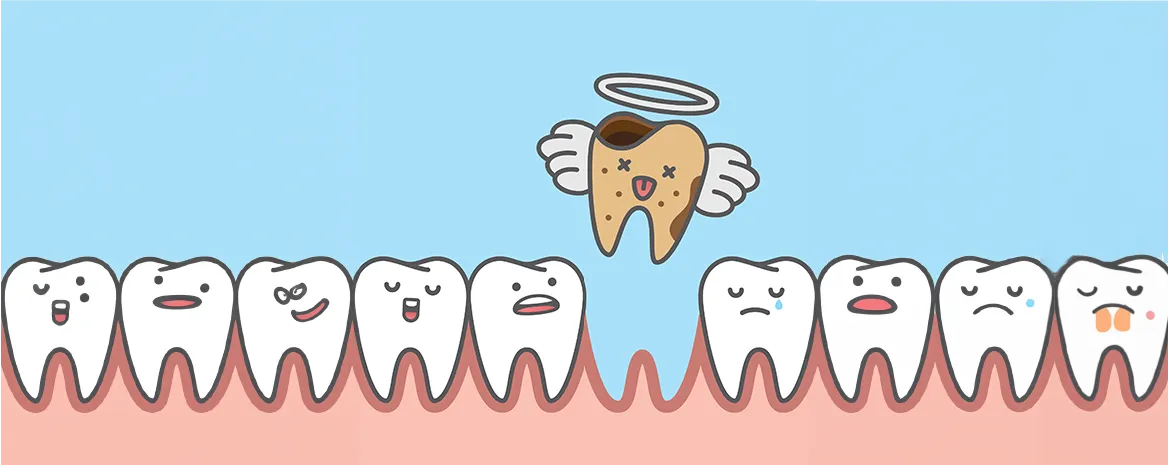Everything You Need to Know About a Dead Tooth

Everything You Need to Know About a Dead Tooth
A "dead tooth" might sound alarming, but it's a fairly common dental issue with solutions available. Understanding what causes a dead tooth, how to recognize it, and what treatment options exist can empower you to take action and protect your oral health.
What is a Dead Tooth?
A dead tooth, also known as a non-vital tooth or dental necrosis, occurs when the blood supply to a tooth is cut off, leading to the death of the pulp—the inner chamber containing nerves and blood vessels – has been damaged and no longer receives blood flow.
Causes of a Dead Tooth
Several factors can lead to a tooth dying:
- Trauma or Injury: Injury from sports accidents, falls, or blunt force trauma can disrupt blood flow to a tooth.
- Untreated Decay: Deep cavities allow bacteria to reach the pulp, causing infection and inflammation that can eventually kill the pulp.
- Large Fillings: Sometimes, extensive fillings (especially those done many years ago) can irritate the pulp and lead to its demise.
- Gum Disease: Advanced gum disease (periodontitis) can affect the roots of the teeth and potentially lead to pulp death.
Recognizing a Dead Tooth
- Discoloration: A dead tooth often turns darker in color, ranging from yellow to gray or black, as blood cells die inside the pulp.
- Pain: Some people experience mild to severe pain, while others feel no pain at all. The pain may be constant or intermittent.
- Swelling: The gums around the dead tooth may become swollen and tender.
- Bad Breath or Taste: An infection in the dead tooth can cause bad breath or a foul taste in your mouth.
- Pimple on the Gums: A small, pus-filled pimple may develop on the gums near the affected tooth.
Why Treatment is Important
A dead tooth won't heal on its own. If left untreated, the infection can spread to the surrounding bone, leading to an abscess and potentially more serious health complications.
Diagnosis and Treatment
If you suspect you have a dead tooth, it’s crucial to visit a dentist for a confirmed diagnosis. At Quality Care Global, we connect you with top dental professionals who can provide an accurate assessment and effective treatment options. The dentist will typically perform a visual examination and may use X-rays to assess the health of the tooth’s pulp.
Treatment Options
The good news is that a dead tooth doesn't always have to be removed. Here are the common treatment approaches:
- Root Canal Therapy: This is the most common treatment for a dead tooth. The dentist removes the damaged pulp, cleans and disinfects the canals inside the tooth, and then fills and seals them. The tooth is usually capped with a crown for protection.
- Tooth Extraction: If the tooth is severely damaged or infected, it may need to be extracted. A dental implant or bridge can replace the missing tooth.
- Crown: After a root canal, a crown may be placed on the tooth to restore its shape, appearance, and functionality.
Prevention and Aftercare
Preventing a dead tooth involves maintaining excellent oral hygiene, including brushing twice a day, flossing daily, and regular dental check-ups. Additionally, wearing a mouthguard during sports can help prevent traumatic injuries to your teeth.
Aftercare following treatment for a dead tooth is important. For root canal therapy, you might need to avoid chewing on the affected side until the treatment is complete and the crown is placed. It’s also important to continue good oral hygiene practices and schedule follow-up visits with your dentist to ensure the tooth remains healthy.
Long-term Considerations
A treated and restored dead tooth can last a lifetime with proper care, but it’s vital to monitor the tooth for any changes. Because a dead tooth is more brittle than a live tooth, it can be more susceptible to fractures.
Conclusion
Understanding the urgency of treating a dead tooth and the benefits of professional care can safeguard your health and ensure you receive the most appropriate treatment. Don’t hesitate to contact a Quality Care Global-affiliated dentist to ensure your dental needs are met promptly and professionally.

